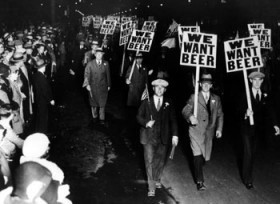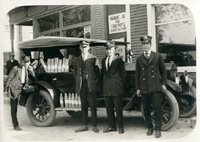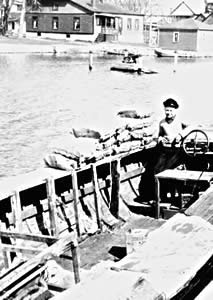Summary | Excerpt | Reviews | Beyond the Book | Read-Alikes | Genres & Themes | Author Bio

This article relates to In the Country of the Blind
 Press, the protagonist of In the Country of the Blind, lives in Vermont near a forgotten trail that rum-runners used to smuggle alcohol into the United States during Prohibition. "The Nobel Experiment," as the 18th Amendment to the Constitution was called, was an attempt at social engineering lasting from 1920 to 1933.
Press, the protagonist of In the Country of the Blind, lives in Vermont near a forgotten trail that rum-runners used to smuggle alcohol into the United States during Prohibition. "The Nobel Experiment," as the 18th Amendment to the Constitution was called, was an attempt at social engineering lasting from 1920 to 1933.
Section 1 provides the heart of the 18th Amendment:
After one year from the ratification of this article the manufacture, sale, or transportation of intoxicating liquors within, the importation thereof into, or the exportation thereof from the United States and all territory subject to the jurisdiction thereof for beverage purposes is hereby prohibited.
 Note that it didn't forbid the drinking of alcohol. That, and the public's undiminished appetite for the liquid, made the fortunes of famous gangsters like Arnold Rothstein, Al Capone, Bugs Moran, Dutch Schultz, Lucky Luciano, and others. Prohibition made the "Mob," and the Mob made money. Even many legitimate fortunes might be traced back to the illegal importation of liquor. Rumor has it that flaunting the provisions of the 18th Amendment was the foundation of the Joseph Kennedy fortune.
Note that it didn't forbid the drinking of alcohol. That, and the public's undiminished appetite for the liquid, made the fortunes of famous gangsters like Arnold Rothstein, Al Capone, Bugs Moran, Dutch Schultz, Lucky Luciano, and others. Prohibition made the "Mob," and the Mob made money. Even many legitimate fortunes might be traced back to the illegal importation of liquor. Rumor has it that flaunting the provisions of the 18th Amendment was the foundation of the Joseph Kennedy fortune.
Rum-running, as a term, traces to Florida. A fast boat to the Bahamas could bring back a fortune in alcohol, generally Caribbean rum. One of the most famous rum-runners was William McCoy, a captain and boat builder whose supply was known to be of such high quality that his booze was called "the Real McCoy." Some say that's the source of the colloquialism, although many etymologists, abstainers or not, disagree.
The far northern reaches of Vermont, with Canada a few wooded miles above, became a prime route for liquor smuggled in from our less puritanical neighbor. In fact, Vermont's history as a clandestine port-of-entry can be traced back two centuries or more. There's even an area named Smuggler's Notch (east of Burlington, north of Stowe) with a mountain pass nearby. Other routes ran from places like Highwater in Quebec into Vermont, then Westfield, Waterbury, Montpelier, and Barre. Smaller towns like Newport, Richford, and Lyndonville were taken over by bootleggers. Even an independent part-time rum-runner could make $125 a night for transporting a load, which was a veritable fortune during a period when the average income ranged between $1,300 and $1,400 a year. There are reports that the "king" of Vermont bootleggers, a man named Conrad LaBelle, made $100,000 the first year he began rum-running.
 As "revenuers" began to patrol bootlegger routes on land, Smuggler's Notch Pass may have been a secondary route to many rum-runners, especially those who could navigate a large boat on Lake Champlain. There were no "border checkpoints" on Champlain, but there were plenty of inlets, islands, bays, and tributaries, each providing excellent hiding places.
As "revenuers" began to patrol bootlegger routes on land, Smuggler's Notch Pass may have been a secondary route to many rum-runners, especially those who could navigate a large boat on Lake Champlain. There were no "border checkpoints" on Champlain, but there were plenty of inlets, islands, bays, and tributaries, each providing excellent hiding places.
The Lake Champlain Boat Patrol wasn't organized until 1924, but for every action there is a reaction. If disguising a load of booze within legitimate cargo didn't work, a bootlegger could rely on speed. One enterprising rum-runner installed two World War I Liberty aircraft engines on his boat to outrun the Boat Patrol. And the bootleggers were clever, sometimes towing loads of alcohol underwater behind the boat or packing crates with rock salt so that the alcohol could be tossed overboard if the rum-runner was confronted by the Boat Patrol. The salt would eventually dissolve, and the crate would later float to the surface where it could be salvaged.
Even though national Prohibition began in 1920, Vermont was already a "dry" state. In 1853, it became the second such in the U.S.A. Vermonters, being practical folk, didn't put cider on the forbidden list, and hard apple cider can have up to 6% alcohol content. Those who want to know more about rum-running, bootlegging, and the Green Mountain state might seek out Adam Krakowski's recently published Vermont Prohibition: Teetotalers, Bootleggers and Corruption or Jay Craven's critically praised independent film Disappearances.
Protest, courtesy of brattleborochamber.org
U.S. Customs with seized car and alcohol, Swanton, VT, courtesy of vermonthistory.org
Bootlegging boat, courtesy of vermonter.com
Filed under People, Eras & Events
![]() This article relates to In the Country of the Blind.
It first ran in the November 16, 2016
issue of BookBrowse Recommends.
This article relates to In the Country of the Blind.
It first ran in the November 16, 2016
issue of BookBrowse Recommends.
Your guide toexceptional books
BookBrowse seeks out and recommends the best in contemporary fiction and nonfiction—books that not only engage and entertain but also deepen our understanding of ourselves and the world around us.